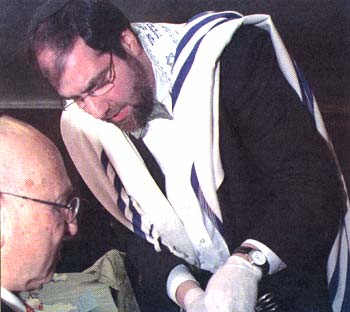
March 12, 2004

Cantor Philip Sherman performing the bris
(photo: Michael Datikash)
Acting the Part
At 8 o'clock on a Friday morning in Manhattan's Spanish
and Portuguese Synagogue, Cantor Philip L. Sherman is about to perform what
might be his 15,000th brit (give or take a dozen). In blazer and bowtie, tzizit
swaying over his khakis, he hums a tune as he unpacks his instruments.
Sherman, 47, used to be the chazzan here. But since 1990, he's worked as a
full time mohel. In the 1970's when he was a student in the joint program
at Columbia University and the Jewish Theological Seminary, he spent a year
learning the trade with the chief mohel of Jerusalem.
That's the kind of training that's needed, not the mini-course offered to
physicians. "Doctors are not mohels," he says unambivalently. Observant
doctors don't perform brisses because of the Talmudic injunction against infringing
on another's livelihood.
"A mohel is a properly trained, observant, non-medical religious functionary.
Someone who is not observant is not qualified to perform a religious lifecycle
event," he says. Of course, some mohels with impeccable credentials and
technical skills lack "bedside mannner."
Or stage presence. "Please join us, we're about to begin!" Sherman
urges the crowd into the majestic sanctuary.
"The Torah tells us to perform the bris - without explanation,"
he explains. The maternal grandmother carries the infant on a ruffled pillow,
and hands the bundle to the baby's grandfather in bowler hat, waiting in a
throne-like chair.
She had asked about anesthesia. Sherman advises against their use. Topical
anesthetics can cause swelling and bleeding and they were not tested for use
on eight day old babies, "and they don't help," he says. To reduce
discomfort, the baby can suck on a gauze pad dipped in kosher sweet grape
wine or kosher grape juice.
Sherman takes the father aside. The mitzvah to do the
bris belongs to him. Three fathers availed themselves of the privilege last
week. (Sherman gets things ready, but the father does the actual cut.) This
dad delegates Sherman.
In less than a New York minute, the infant emits a brief wail. Sherman slips
the gauze-wrapped foreskin into his pocket (for interment in dirt later),
the parents recite the blessings, and Alexander Rand, aka Alter Bezahlel,
named for his other grandfather, who was a Holocaust survivor, falls asleep,
in his uncle-the-doctor's arms.
"I was watching very carefully," says Uncle Larry, an ob-gyn who
performs circumcisions daily. "The mohel was perfect."
Scrutiny doesn't bother Sherman. There's always some expert on hand - a urologist,
a pediatrician, an obstetrician, a medical malpractice attorney. "I
answer their questions respectfully and patiently."
Joining the family for the festive meal in the synagogue ballroom, he says,
"I don't strap the baby down, I don't tell jokes, and I don't give out
refrigerator magnets.
On of the guests requests a business card. "Do you go to New Jersey?"
a man inquires near the chafing dishes. "I go all over the world,"
Sherman says. (He has worked in the Far East and Bermuda.)
His card reads, "Certified Mohel/SAG." Sherman belongs to the Screen
Actors Guild. He played the rabbi in a dot.com commercial with Whoopi Goldberg.
No audition was required. He said, "The people connected with the commercial
knew me from various brisses."
Adapted from "Postmodern Mohels" article by Martha Mendelsohn
